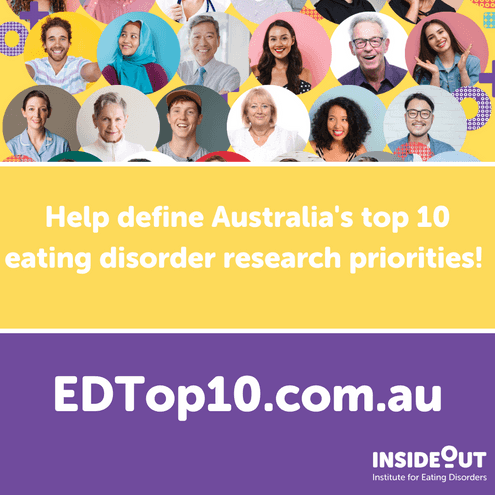
study
New Study aims to identify Top 10 Eating Disorder Research & Translation Priorities for Australia
29 Sep, 2020
Australians have a chance to determine the future of eating disorder research and policy with the launch of a new study by the InsideOut Institute for Eating Disorders, conducted in association with the James Lind Alliance in the UK.
The 10 minute survey can be found at www.EDTop10.com.au
EDTop10.com.au invites people who have a lived experience of an eating disorder and their loved ones, as well as clinicians and researchers, to identify and prioritise the Top 10 unanswered questions or evidence uncertainties they agree are the most important.
InsideOut’s National Project Manager and study investigator Peta Marks says research plays a vital role in discovering new treatments and ensuring existing treatments are being delivered in the best possible ways.
“Great research should improve people’s lives, help prevent illness wherever possible, and be easily translated into real world settings - where people live and are treated”
“A Top 10 research and translation priority list will help governments, researchers and research funding bodies in Australia to identify where their focus needs to be.”
“We are asking everyone who is impacted by eating disorders, both in their work and in their life, what they think researchers should be studying and what would make a difference to them.”
“We need to hear from people with all types of eating disorders and their families, about the type of research that would transform their lives. We also need to hear from clinicians about the type of research that would help transform their practice.”
Analysis of the Top 10 Eating Disorders Research & Translation Priorities Project will be conducted by an independent UK based consultant to ensure all views are represented equally.
“This Project is aligned with the Priority Setting Partnership (PSP) methodology developed by the James Lind Alliance (JLA) to ensure that consumers, carers, clinicians and researchers have equal voice in the prioritisation process - that’s why we established the JLA Advisory Committee, which consists of 4 volunteers representing each stakeholder group. There is also an independent JLA Adviser to ensure that the process is fair and transparent," said Ms Marks.
Lived Experienced Educator Shannon Calvert says she encourages people with a lived experience of an eating disorder to contribute their broad and diverse perspectives to the survey.
“Our voice provides insight and a perspective that cannot be obtained from data alone.”
“Contributing in partnership with researchers and clinicians, this survey is our opportunity to identify treatment gaps and priorities, placing the consumer and carer needs at the centre of eating disorder research,” Ms Calert said.
Eating Disorders Victoria CEO Belinda Caldwell is representing carers and says their voice is crucial.
“Hearing from families and carers is so critical to understanding where the gaps in early intervention, treatment and relapse prevention are.”
“Hearing from the coalface provides robust intelligence of where research needs to focus its attention and how it can be best translated,” Ms Caldwell said.
The National Director of the National Eating Disorders Collaboration (NEDC) and clinical representative, Dr Beth Shelton, is urging health workers to participate.
“As National Director of the NEDC, I value this opportunity to contribute to the development of a shared approach to research on eating disorders – integrating lived experience, research and clinical perspectives. Please bring your voice and views to this important work,” said Dr Shelton.
Australian and New Zealand Academy for Eating Disorders (ANZAED) President elect Dr Sian McLean is inviting eating disorder researchers to have their say.
“In my roles as President-elect of ANZAED and a researcher, I see first hand the contribution research makes to advancing our field."
"I invite all researchers in our sector to contribute their views to this survey to join with clinicians and people with lived experience to identify and highlight important areas of eating disorder research,” Dr McLean said.
Ms Marks says the Top 10 Eating Disorders Research & Translation Priorities Project gives agency to the people most impacted by decisions about what research is given precedence.
“Eating disorder research has been underfunded in Australia and internationally, and until recently, it has been quite disconnected from those who it impacts the most.”
“Eating disorders have a devastating physical, psychological, social and economic burden yet eating disorder research funding doesn’t match the seriousness and high costs incurred by the illnesses,” she said.
Currently, around 1 million Australians are suffering from an eating disorder and it’s estimated another 20 per cent of females have an undiagnosed eating disorder. Mental health and body image continue to rank among the key concerns of our young people.
“Surveying the community about what they think is important closes the gap between academia and the everyday experience of individuals affected,” said Ms Marks.
The Project will form part of Federal Government funded Australian Eating Disorders Research & Translation Strategy 2020-2030, to be released by the end of the year.